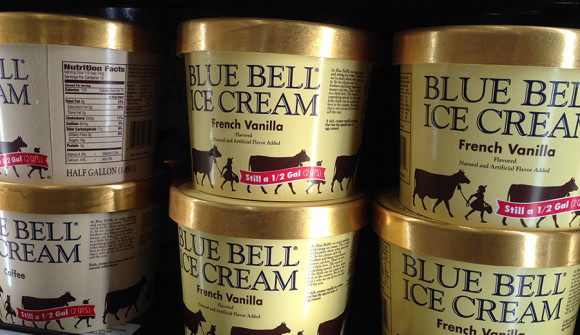While peanut butter and cantaloupe made news in recent years, ice cream is the latest item to be pulled off grocery store shelves due to foodborne-illness.
Brenham, Texas-based Blue Bell Creameries’ listeria-tainted ice cream has been linked to at least 10 illnesses and three deaths. Federal officials said the firm knew about a listeria problem back in 2013 in its Oklahoma plant but did not report it.
The company voluntarily pulled all of its ice cream and frozen snacks off store shelves in the 23 states in which it sells.
Blue Bell also announced plans to lay off 750 full-time and 700 part-time workers and furlough another 1,400 employees due to the outbreak while it cleans up its plants and tries to get its manufacturing and sales back on track. They are the firm’s first layoffs in more than 100 years in business.
The company hasn’t released estimates on what the recall will cost but the impact of voluntary recalls like the one undertaken by Blue Bell have implications for the company and its insurer, according to experts.
The effects can vary by company, situation and how a company responds to the crisis, said Bernie Steves, managing director of AON Risk Solutions Crisis Management Practice, and Michael McGaughey, a Los Angeles-based partner in the Insurance Coverage Group at Lowenstein Sandler.
According to these experts, manufacturers can mitigate the damage by being proactive.
“It’s getting out in front of the issue, being honest with your customers … your employees, your suppliers and everybody else that might be involved,” said Steves. “Depending on how well you do that, really dictates the impact of the recall.”
Proactive management, according to Steves, means being able to identify the specific product, the product location and the source of the contamination.
“Getting out in front of those things so that you’re able to assure your customers that you’re making products going forward in a safe manner,” said Steves.
Recall Policies
According to the experts, most companies like Blue Bell have a commercial general liability and a recall policy that provides coverage for the cost of a recall, loss of profits and reputational damage.
McGaughey said recall policies typically include a crisis management component within them.
“You are entitled, as the insured, to call upon crisis management firms. Usually, the policies will identify some select number of firms and/or individuals at those firms who can be contacted to handle crisis management in the event of a recall and those fees are covered by the insurance, assuming that the claim is covered in the end. There’s not even a need to get pre-approval from the insurance company,” he said.
Sometimes companies can negotiate in advance with the insurer on which crisis management company they prefer, and use crisis consultants on a pre-incident basis.
“It really is a full risk management circle here where you’ve got your pre-incident assistance from the insurer, you’ve got your crisis management response available from the insurer, and you’ve got the financial safety net of the insurance in place,” said Steves.
Was this article valuable?
Here are more articles you may enjoy.



 Cuts to Funding Mean Risks Will Pivot in Human Services Market
Cuts to Funding Mean Risks Will Pivot in Human Services Market  Kyle Busch and Wife Settle Lawsuit With Pacific Life and Insurance Agent
Kyle Busch and Wife Settle Lawsuit With Pacific Life and Insurance Agent  Anthropic’s Claude Chatbot Goes Down for Thousands of Users
Anthropic’s Claude Chatbot Goes Down for Thousands of Users  Ford Recalling 4.3 Million US Vehicles Over Software Issue
Ford Recalling 4.3 Million US Vehicles Over Software Issue 


